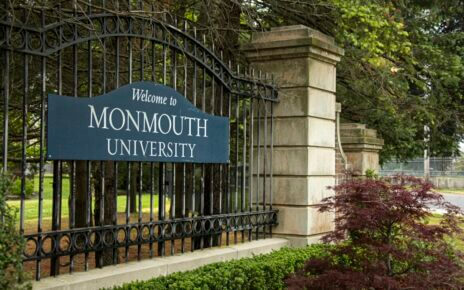After another increase in tuition, students may worry how their money is being spent.
Some suspicions of rising administrative expenditures remain, and students wonder if Monmouth’s growing administration is contributing to annual tuition hikes.
The following questions and answers are from an in-person meeting with University President Grey Dimenna, Esq., on Friday, March 29:
What is the correlation between tuition and administrative costs?
“Any time we add expenses, it impacts on tuition. But even when we don’t add expenses, it impacts on tuition. Costs go up; inflation happens; we negotiate in salary increase for employees and those are well deserved. Our employees work very hard, and they should be paid a fair wage and they should get good benefits…The federal government imposes all sorts of requirements that not only impose costs, but require us to hire administrators to handle those areas. For instance, Title IX; we have to have a Title IX coordinator because we’re required to by law. That has costs. Some of those costs are not avoidable…”
Regarding the creation of new administration level, in looking at the current operational chart and ones from previous years, operations under “Vice President of Academic Affairs/Provost” had either been occupied by Deans or simply did not exist; all positions beneath the Provost reported directly to the Provost.
“There was a whole host of positions beneath the Provost that reported to the provost, they just had different titles…There has been an expansion; I don’t think it’s a huge expansion and I certainly don’t think it’s the cause of tuition going up. Tuition is basically set to, as you know because you pointed out in your thing, we are very highly tuition-dependent so when we do the budget each year we estimate all the revenue that will be coming in, which will be: tuition, room, board, comprehensive fee, outside money donated by donors, interest that we earn, ticket sales from sporting events from other events. All those sources go in. We also do enrollment projections of undergraduate and graduate levels.”
 In looking at the current operational chart and ones from previous years, operations under “Vice President of Academic Affairs/Provost” had either been occupied by Deans or simply did not exist.
In looking at the current operational chart and ones from previous years, operations under “Vice President of Academic Affairs/Provost” had either been occupied by Deans or simply did not exist.
“There was a whole host of positions beneath the Provost that reported to the provost, they just had different titles…There has been an expansion; I don’t think it’s a huge expansion and I certainly don’t think it’s the cause of tuition going up. Tuition is basically set to, as you know because you pointed out in your thing, we are very highly tuition-dependent so when we do the budget each year we estimate all the revenue that will be coming in, which will be: tuition, room, board, comprehensive fee, outside money donated by donors, interest that we earn, ticket sales from sporting events from other events. All those sources go in…”
Would you say that we take a top-down approach (to University operations)?
“No, I don’t see as a top-down approach; I see it as a partnership everyone is working together. The administration is not up here and faculty and staff are down here; we’re equal…Are there faculty and students who see it that way? I’m sure there are. But I disagree.”
But you said that investments in administration are investments in students. So if it’s not top-down, in a way that the more administration we have the better students will be, that to me is top-down. Could you just clarify that?
“What I mean by that is, by investing in administration that could also be investments in students’ success. If we invest in counselors, it’s nice that we could have students go to our counseling office and see someone right away. That’s an investment in administration. If we need police officers to keep campus safe, that’s investment in administration…All that I’m saying is, I don’t want it to be interpreted that adding administration is adding a level of bureaucracy.”
In bettering the student experience, would you say lower tuition is inherent to a better student experience?
“Of course, look I was a student once…my tuition went up…I was like, ‘are you kidding me? You’re charging me that much for tuition?’ I was outraged. And when they raised tuition in law school, I wrote a letter to the dean; I was upset. I know students don’t like tuition going up, and I don’t like raising tuition. But I also want the Monmouth education to be good, and to give the services that people want and expect. When you come to Monmouth, you expect to have an experience that you’re treated like an individual not a number…I hate raising tuition and we’ve tried to keep the increases down, but I realize that even that low a tuition increase that for some students, it’s tight and they have to leave. And I hate that.”
In the event that enrollment is down, because we are so tuition-based that would mean some revenue would be down, where are the cuts and increases going to compensate for that?
“The initial budget is done in January/February by me and the Vice Presidents. We take it to the Board of Trustees at the February meeting, which would also include the proposed tuition and fees increases. In June, we have a better idea of what enrollments are looking like for the fall and in June, the Board approves the final budget. We can make adjustments to the budget in June. So if…enrollments are not looking really rosy, what we would do then is make adjustments in the expense side to match the revised estimates on the revenue side. So what that would mean is I would go back to my Vice Presidents… and determine what we would have to cut…”
So, in the event that there are more expenses than the revenue, where do those cuts go?
“It’s not that easy or that simple; it really depends on the timing and what’s going on. Like I said, I go back to each Vice President and say ‘we need to cut money. What can you give up?’…I can give you an example when I was General Counsel. I tried to cut outside legal fees and I also tried to manage insurance policies…Other examples are we could eliminate positions or we could decide to hold positions vacant for several months before refilling them, saving salary there in the meantime…A big one which we’ve been doing over the years is cutting employee health care costs…We came up with an idea, a few years ago, to offer a less expensive health care plan which would save a lot of money and we thought was pretty equal to the nice plan that we had, and then we went through a very concerted effort to make employees to switch to the cheaper plan with various incentives…Over several years, we’ve saved about $2.5 million in costs…But in terms of what expenses we would cut, a big one was employee benefits and trying to get people to switch their health care plan.”
What can we do in order to become less tuition-dependent?
“What we need to do is try to develop other revenue streams, which is hard. We’re not going to get money from the state of New Jersey. Legally, we’re entitled to it, but we’re not going to get it. We need to grow the endowment, and that’s really a function of fundraising. We need to grow more scholarships… We’re adding a position here, an administrative position, which is going be in charge of raising money from corporations and foundations. And Vice President Meer tells me that he believes that this person will bring in much more money than their salary is…”
That job couldn’t have been delegated to someone already existing in administration, or was it absolutely necessary to create an entirely new position?
“Well actually what we did, truth be told, is we used a vacant current position…we had someone who was a major gift officer who shifted over to be a development officer in a school, and so that positon was vacant. So we decided to use that money to create this position. So we weren’t creating a new position; on the other hand we didn’t cut the position either, which would’ve saved money. The answer is: could it have been absorbed by other people? Yes and no…It’s not like we don’t have people around here that don’t have enough to do. I think it’ll be a lot more lucrative and successful if we have someone whose role is to concentrate on this area instead of having someone who on top of everything else they’re doing, do this too…”
We have a sort of backstop for student enrollment. Is there a numerical value for faculty and administration in a ratio to the students coming in?
“Well, if you have few students, theoretically you need fewer faculty and administrators, and staff to accommodate them…Sometimes to maintain accreditation, we have to add faculty. In terms of administrators, sure. If students go down in certain areas, would we need as many administrators? No. The other thing I should tell you is that whenever there’s a vacancy here…, I have to approve it. There have been plenty of times this year when I’ve said no, because I don’t think we’d need as many people in that area or I’m trying to save money, or whatever.”
So you don’t see always increasing administration as the solution?
“Oh, of course not…[But]there’s a point below which I think if it hurts the student experience, that’s a problem. But I’ve not filled positions here… In fact, there’s an example recently where they wanted to add a half-time staff position in a program and I said no…I’m not a proponent that administration, in and of itself, is always good; it depends on what they are doing. And when we can cut areas, we do…I’ve cut positions in the Provost area I’ve cut positions everywhere. Is it hundreds of positions? No, because I don’t think we’re that fat or bloated.”
“And I think that it is great that you are doing this article. Obviously tuition increases have a major impact on students and their families, and I think that students ought to know as much as possible on why it’s being done.”
PHOTO COURTESY of Monmouth University
PHOTO TAKEN from USNews.com




